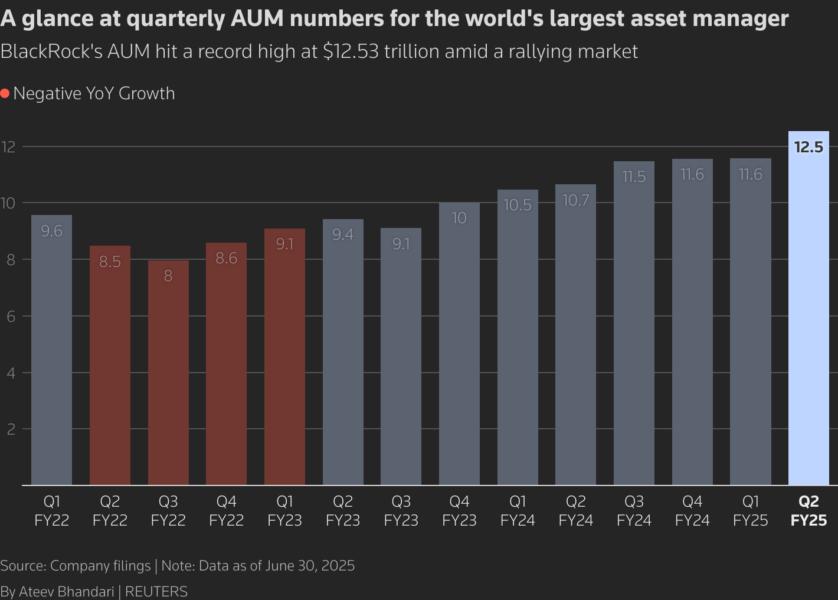BlackRock shares slump even as assets hit record $12.5 trillion on market rally
- BlackRock's AUM rose to $12.53 trillion, driven by market rally
- Long-term net inflows fell 9.8%, impacted by $52 billion withdrawal
- Private markets and technology services boost revenue, despite volatile market
- Equity inflows surged to $28.8 billion, up from $6.44 billion last year
- Shares fall over 6% due to investor concerns on outflows
BlackRock's BLK assets under management hit a new high in the second quarter as global markets rallied, but its shares tumbled as much as 7% after a large Asian institutional client pulled money from an index strategy.
During the quarter ended June 30, BlackRock's long-term net inflows fell to $46 billion in the quarter, down 9.8% on a year ago and below average analyst expectations of $53.5 billion, with $52 billion pulled from a lower-fee index fund by the client.
The latest numbers from BlackRock highlight the pressures facing the broader asset management industry, which is attempting to quickly diversify revenue streams as it grapples with diminishing fees from lower-fee index strategies.
"There was some disappointment in the net flows, which were softer relative to recent quarters. Some investors are interpreting that as there are potentially more outflows from this client coming in future quarters," said Kyle Sanders, a financial services analyst for Edward Jones.
Overall net flows came in at $68 billion, driven mainly by cash-management and money-market funds.
BlackRock's total revenue - most of which is earned as a percentage of assets under management - rose to $5.42 billion from $4.81 billion a year ago, driven mainly by a 6% rise in organic base fee growth, but fell slightly short of average analysts' expectations of $5.46 billion.
BlackRock's fixed-income executives had expressed concerns last month that ballooning U.S. debt could suppress appetite for longer-dated Treasuries and the dollar, which recorded its worst first-half performance this year since 1973.
Safe-haven Treasuries and the greenback have also suffered as markets price in tax cuts and spending hikes from Trump's recently passed "Big Beautiful Bill," which nonpartisan analysts predict will add more than $3 trillion to the country's $36.2 trillion debt.
Overall retail inflows for BlackRock fell to about $2 billion from $5.7 billion a year earlier, weighed down mainly by equity outflows as retail investors reduced contributions due to market volatility.
"We're entering our seasonally strongest back half of the year with considerable momentum and a robust pipeline," BlackRock's CEO and Chairman Larry Fink said on a post-earnings call with investors.
Equity product inflow surged to $28.8 billion, compared to $6.44 billion a year ago, while fixed-income products saw outflows of $4.66 billion, BlackRock said.
Trends for the business are being closely scrutinized, given the turbulence in U.S. Treasuries this quarter. The benchmark 10-year yield US10Y recorded one of its biggest weekly increases since 2001 after the "Liberation Day" shock.
Its performance fees fell 42.7% to $94 million in the reported period, after falling nearly 71% in the first quarter. Total expenses rose to $3.69 billion from $3.01 billion last year.
Shares of the asset manager were down more than 5% in afternoon trading on Tuesday, wiping out most of its gains this year. The shares had touched a record-high on Monday.
"Shares of BlackRock should trade lower today as we weren't impressed with the results, given the low-quality beat that was more expense-driven than anything. Then active flows also missed expectations," said David Wagner, portfolio manager at Aptus Capital Advisors, which manages $15 billion of assets and is an investor in BlackRock.

BRIGHT SPOTS
Despite the client redemption and the revenue miss, most analysts agreed that BlackRock's latest quarterly performance was solid, given the current backdrop of market volatility.
BlackRock's assets under management touched a record $12.53 trillion in the quarter, up from $10.65 trillion last year as markets rallied on the prospect of trade deals and interest-rate cuts from the U.S. Federal Reserve.
"In our view, BlackRock is entering into a new chapter in its growth story. While the past two decades have been marked by the explosive growth in ETFs, the next phase of the firm's evolution will depend on private markets and technology via Aladdin," said Sanders.
BlackRock has been pivoting towards private markets, which provide higher margin revenue compared to those from low-cost ETFs, where it faces intense competition and fee compression as the market matures.
Private markets saw inflows of $6.82 billion in the quarter. The New York-based firm said at its investor day last month that its private markets and technology businesses would make up 30% or more of its total revenue by 2030, up from 15% in 2024.
As part of this push, BlackRock last month unveiled plans to include private assets in its retirement plans, which account for more than half of the money the company manages.
Technology services revenue rose 26.3% to $499 million, reflecting the first full quarter of data provider Preqin, which BlackRock bought in a $3.2 billion deal last year. The deal closed on March 3, 2025.
Excluding some one-time charges, net profit jumped to $1.88 billion, or $12.05 per share, for the three months ended June 30, up from $1.55 billion, or $10.36 per share, a year earlier. Analysts on average were expecting a profit of $10.82 per share.
Thanks to a weaker dollar, BlackRock recorded a positive foreign exchange impact on assets under management of $171.52 billion, compared with a $35.45 billion decline in the year-ago quarter.